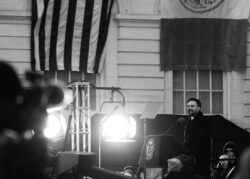Jan. 17: “Welcome to Manchester, where it’s a balmy 16 degrees. Anything you leave on the plane will be divided among the flight attendants.”
And thus the cheery Southwest crew introduces Ariane and me to New Hampshire, where we are spending the weekend with our friend Hillary, the Women’s Outreach Coordinator for Wesley Clark. Although the action this weekend is largely concentrated in Iowa, the New Hampshire primary is just a week away, and the media deluge and local lunacy that are the privileges of the early states in primary season are well underway.
Hillary has only been in New Hampshire since Christmas, and she gets sufficiently lost for me to receive a thorough tour of Manchester, its pleasant rows of snow-covered A-frame houses and its endless sprawl of strip malls. I notice a disproportionate number of front lawns bearing political signs, but perhaps I am just more sensitive to them. Eventually we make it to campaign headquarters, and I feel like I am back in 1998 San Francisco, touring an Internet start-up. The space is an exposed brick converted warehouse, and the workers are young, eager and loaded up on Diet Coke. The hopeful news clippings on the wall reinforce the feeling of just-around-the-corner-triumph, while everything from the plastic plates in the kitchen to the folding chairs behind the desks suggests a complete lack of permanence. We soon leave for our first event, located at a lobster tail diner where the owner has agreed to host a “Women for Clark” event prior to the big afternoon rally in Pembroke.
Mary Frances Berry, the head of the U.S. Civil Rights Commission, Wisconsin Lieutenant Governor Barbara Lawton and Sharon Watkins, the famed “Enron whistle-blower” all speak briefly, and it is Watkins who comes across as the real kick-ass woman. She calmly refers to herself as her household’s primary bread-winner and muses regretfully that, unfortunately for the prosecution of Ken Lay, it “is not a crime to be an idiot.” She also refuses to allow Hillary any jibes at the state of Texas, even as she crusades against Bush.
At the end of the event we make our way past a handful of college kids who are tailing the Clark campaign and handing out Kerry fliers. Hillary, who only months before had hoped to work for Kerry, quickly dismisses his campaign as unprofessional and pathetic. We head to Pembroke, and I begin to understand the nature of campaign work.
The rally is held in the Pembroke high school gym, and as I walk on the springy hardwood and gaze at the championship banners, I momentarily wish I were here to play a high school basketball game. A wave ripples through the stands. Do Republicans do the wave? Of course they do. Of course they don’t. I don’t know. Soon the crowd breaks into chants of “U Wes A!” “U Wes A” and the campaign “surrogates”-notables supporting the campaign and speaking on Clark’s behalf-enter onto the center stage. They are an impressive bunch, but they are all dwarfed by the awesomeness of Michael Moore and his magnetic ‘fat guy in a baseball hat’ persona. He speaks first:
“Georgie Bush, you only have a few more months,” he says. Moore lists the General’s credentials-Rhodes Scholar, Four Star General, Supreme Allied Commander, Europe-and then he throws out “Captain of the Debate Team.” After a suitable dramatic pause, he roars “I know what you’re thinking … I want to hear that debate! The General versus the Deserter! I want to hear that debate!” (Moore’s technically false accusation-”deserter”-will later get Clark into hot water.) Among the frenzied crowd one man yells “Moore for President!” Moore stops his speech, calls for silence, and declares that to be a disgusting idea: “nobody wants to see this rolling around the White House.”
Moore’s shtick is so good that I am doubtful that Clark can follow him up. But the General looks perfect. If his campaign flops, he could move to Hollywood and just play the role of President for the next four years; he is unmistakably presidential in his figure and bearing. And, to my surprise, his speech is excellent. He throws out a bit of humor: “My father was Jewish, my mother was Methodist, and so they compromised, and raised me a Methodist.” He tosses off a bit of leadership rhetoric: “Leadership is not posing for the cameras in an air force plane!” And he drops enough policy wonk talk to demonstrate that he is more than just a General running for President.
That evening, back at Headquarters, we wait to pick up a colleague of Hillary’s to go to dinner. I fail to find anything to read that is not about the Clark campaign, leaving me exposed to chit-chat with campaign workers, of which I have already become a bit weary. Soon enough, I receive a lecture about my cynicism, and how it contrasts with the positive vision of the General, and I become anxious for an exit from the campaign cocoon.
- * *
I have been a long-time cynic with regard to the democratic process, and the election of the Gropenator in my home state of California has only been a further setback. Yet in New Hampshire I was inspired to see note-pad carrying retirees, idealistic college students and passionate veterans spend their afternoons at diners and high school gyms to participate as active citizens. I was a bit put off by the missionary nature of some of Clark’s foot soldiers, but I was impressed with his message, backers and performance; I now understand how people can get caught up in the excitement of a good candidacy.
Jan. 27: A week later, Clark has limped into third in New Hampshire, and Kerry’s second victory speech in as many weeks carries a deliberate tone of inevitability. It seems like the Clark campaign, unless it receives an unexpected shot in the arm on Feb. 3, may be finished by Valentine’s Day. Will the good folks of team Clark join team Kerry? They may already have. The coming weeks are sure to be full of political intrigue among candidates and volunteers alike. But I doubt that the any of the states ahead will enjoy the spirited atmosphere that I found last week in New Hampshire that, briefly but sincerely, was a compelling example of an active democracy. I am glad to have witnessed it.
Jason Maurice is a first-year graduate student. He hopes to marry rich, rubber-stamp the demands of a lying, imperialistic president and then claim to run against that same president as a candidate for the people.




